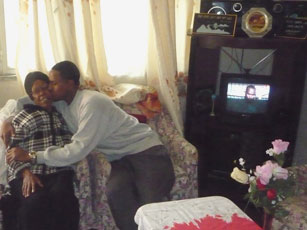Worldfocus
By Tesfaye Negussie
January 22, 2010
It was an elaborate scam: a beautiful bride, a dashing groom, a smiling best man and bridesmaids draped in matching gowns.
The photo was taken to bamboozle American immigration officials. Apparently, the bride was already living in America, and the groom, living in Ethiopia, just wanted to further his education in the U.S. So, he paid her a couple thousand dollars to marry him.
I’ve been told that some Ethiopian men living in America return to Ethiopia for a few weeks just to find a wife and bring her back to the U.S., even though they barely know each other. The man gets a young pretty woman who shares his culture, and the woman gets to come to America.
This is similar to what I used to hear of the young teenage women who lived in rural parts of Ethiopia. They would be married off to wealthy landowners who could afford to pay big dowries to the girl’s parents.
Still others come to America through diversity visa lotteries — a program that gives visas to countries with low rates of immigration to the United States.
The Ethiopian dream is just like the American dream — but with a twist. Ethiopians come to the U.S. to make a living yet often return to Ethiopia to retire.
The dream also casts its fairy dust on Ethiopian pop culture. Ethiopian TV, films and music often depict the experiences of Ethiopian-American immigrants.
Men’s Affairs is a comedic film that follows the antics of a poor Ethiopian carpenter who lies that he lives in America and is just visiting Ethiopia, so that he can get the girl that he desires. For my Father is a drama about a girl who breaks up with her boyfriend to marry a rich man from the U.S.
Ethiopians in America remit about $1.2 billion per year to their families back home. This amount is second only to the total that Ethiopia receives from exports. For the most part, Ethiopians go abroad to make a better life for themselves and give back to their families in Ethiopia, but most dream of returning again.
I grew up in the Washington, D.C. area, which has an estimated 200,000 people of Ethiopian descent — the highest concentration of Ethiopians outside of Ethiopia. As a teenager, I remember learning that Ethiopians owned many of the big nightclubs in the city. As soon as they made enough money, they sold their clubs, and returned to Ethiopia to rejoin their families and invest in their country.
My parents and many of their Ethiopian friends who live in America have lived in the U.S. for about three decades. But they still talk about how they will return to Ethiopia once they retire.
There is a sense of pride that links most Ethiopians to their country. We feel the joy of being with family and a yearning to stay close to our rich history and culture.
We also have a tacit amour-propre, as children of an ancient civilization and the vanquishers of the menacing evil of colonization. Moreover, we are the gatekeepers to an array of ethnicities, languages and religions that have coexisted for centuries.
And even though Ethiopia is now poor, most Ethiopian emigrants dream of the day they will return. Many of them will visit several times before permanently returning — coming back to a country that changes in the blink of an eye.
Ethiopia is the fourth fastest growing economy in the world, according to The Economist. Even though so much has changed, the love is the same, and it feels like they never left.
Many Ethiopian-Americans born in America will stay and raise kids here. We, unlike our parents, have grown with American culture and taken it as our own. But our pride for Ethiopia burns strong. Many of us speak broken Amharic, Oromo, Tigrinya, Gurage — or the language of whatever region our parents are from. We will dress in green, yellow and red patterns. Or wear shirts with pictures of Halie Selassie, as to say, “I am Ethiopian.”
Because the Italians, Jamaicans, Mexicans, Chinese and others who settled in America share a similar journey as the Ethiopians, the Ethiopian-American story is the American story.
So, that is also my story.

Tesfaye Negussie and his grandmother.
My grandmother, who lived with us in America for 10 years, is now back in Ethiopia.
I visited her for several days in Addis Ababa. Since she is very old, it may have been my last time seeing her.
The day I was leaving, I had a terrible stomach ache from something I ate. My grandmother pulled out the one thing she knew would cure me: an old dingy plastic bottle filled with holy water.
It was refreshing as she poured the cool water on my aching belly and head. As she recited prayers under her breath, I remembered those days that I would go to her room to wake her up for breakfast, when she would already be awake thumbing her rosary beads.
And when my sister and I would return from school, she’d hand us huge chunks of ambasha bread that she had prayed over. And we’d have to finish it. Even though our stomachs were full from whatever junk we had picked up at the ice cream truck, we obediently finished every crumb.
Afterward, we would sometimes take Grandma for a walk because she had been inside all day, and this was her only chance to spend some alone time with her grandchildren before Mom and Dad came home.
The water gradually warmed on my skin, and I felt the touch of my grandmother’s fragile hand on my forehead as she prayed. And then my stomach didn’t hurt anymore.
It was good to be home.
—
For more Worldfocus coverage of Ethiopia, visit the extended coverage page: Ethiopia Past and Present.